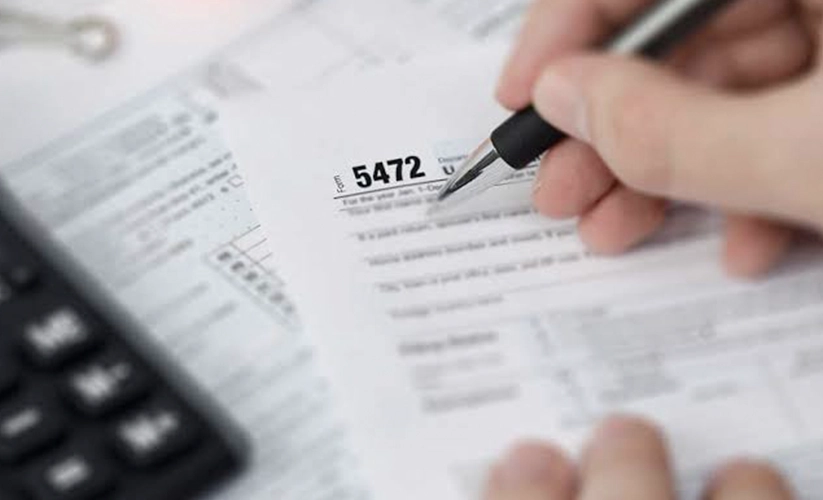Instructions for IRS Form 5472: Forms that Accompany the Information Return of a Foreign-Owned U.S. Corporation
Published:
The Oscar for longest tax form name goes to …
If you are a foreign-owned U.S. corporation, it is important to understand the reporting requirements and documentation obligations associated with the filing of Form 5472, called an Information Return of a 25% Foreign-Owned U.S. Corporation or a Foreign Corporation Engaged in a U.S. Trade or Business.
When completing tax form 5472, it is crucial to include the relevant forms that accompany it, including Form 1120, the tax return for corporations. These forms provide the context necessary to understand the treatment of transactions. The proper records should be maintained for each related party transaction, including monetary exchanges, rental income, and sales of property or services.
The instructions for Form 5472 outline the specific reporting requirements for different types of filing entities, such as foreign-owned U.S. corporations and foreign-owned U.S. disregarded entities, as in a company with foreign ownership without a permanent establishment in the U.S. and files form 8833. It is also important to note the requirements of sections 6038A and 6038C regarding reporting and recordkeeping obligations.
For certain types of related party transactions, specific documentation requirements must be met. This includes reporting the voting power and ownership percentage of the foreign owner, as well as the treatment of transactions under applicable income tax treaties.
Form 5472: Which U.S. or Foreign Entities Need to File with the IRS?
If you are a foreign-owned U.S. corporation or a foreign corporation engaged in a U.S. trade or business, you are required to file Form 5472. This form serves as an Information Return and provides the IRS with detailed information about your related party transactions and foreign ownership. It is important to note that even if your corporation has no reportable transactions during the tax year, you are still required to file Form 5472. The filing requirement applies to both domestic and foreign corporations, as well as certain foreign-owned U.S. disregarded entities. Compliance with the instructions and filing requirements is crucial to avoid penalties and ensure proper reporting of your foreign-owned U.S. corporation.
U.S. Disregarded Entities Owned by Foreign Persons (25% or More)
Whenever a corporation files taxes in the United States, its business ownership can dictate the way it gets treated for federal income tax purposes. The tax filing requirements for foreign businesses requires careful handling of financial records, as well as a thorough understanding of the tax obligations for foreign individuals who may own the primary stake in a U.S. LLC.
If you are a foreign person who owns 25% or more of a U.S. Disregarded Entity, then you may have certain reporting requirements under IRS Form 5472. A foreign-owned U.S. DE refers to a single-member LLC or a branch of a foreign corporation that is treated as a separate entity for tax purposes.
Form 5472 is used to report information about reportable transactions between the U.S. DE and its foreign owner, as well as transactions involving LLC capital contributions or distributions. These transactions must be reported if they occur during the tax year and if the aggregate amount exceeds $10,000.
Reportable transactions include any monetary exchanges, sales, leases, licenses, loans, or other types of exchanges. It is important to note that even if the transaction results in no income from sources considered taxable, it still needs to be disclosed on Form 5472.
Failure to comply with the reporting requirements of Form 5472 can result in penalties for both the U.S. DE and its foreign owner. It is crucial to keep proper records and file the form by the due date of the U.S. income tax return, including extensions.
Domestic Corporations Engaged in Reportable Transactions with Foreign-Owned LLC’s or FSCs
Are you a domestic corporation engaged in reportable transactions with foreign-owned LLC’s or Foreign Sales Corporations (FSCs)? If so, it is important to familiarize yourself with the reporting requirements to ensure compliance.
Domestic corporations that engage in such reportable transactions must file Form 5472, which provides detailed information about them. Reportable transactions include monetary transactions, sales, leases, licenses, loans, and other forms of exchanges. It is crucial to note that even if it does not result in taxable income, it still needs to be reported on Form 5472.
To properly report these transactions, you must include the necessary forms and attachments with your filing. This includes providing information about the foreign-owned LLC’s or FSCs involved in it, as well as details about the amounts.
Failure to comply with the reporting requirements of Form 5472 can result in penalties. Both domestic corporations and their foreign-owned counterparts may be subject to penalties if the reporting requirements are not met after 90 days, and the fee could apply to each responsible party in a given 30-day period. To avoid these penalties, it is essential to keep proper records and file the form by the due date of the U.S. federal income tax return, including any extensions.
Records Requirements for Different Types of Filing Entities
When it comes to reporting reportable transactions and related party transactions, maintaining proper records is of utmost importance. Different types of filing entities have specific record requirements that need to be adhered to.
For domestic corporations, it is essential to maintain records that accurately document the reportable transactions. These records should contain information such as the nature of the transaction, the amount involved, and the parties involved. These records should be kept for at least 6 years from the due date of the tax return.
In the case of foreign-owned US LLCs, the record requirements are slightly different. Along with the aforementioned records, additional details need to be maintained. These details include information about the foreign owner, the foreign corporation engaged in the transaction, and any applicable income tax treaties. Furthermore, these records must be kept for at least 6 years from the due date of the tax return, including any extensions.
Maintaining proper records is crucial because they serve as the foundation for accurately reporting reportable transactions and related party transactions. By keeping detailed and accurate records, you can ensure that you meet the reporting requirements of Form 5472 and avoid penalties for non-compliance.
Instructions for Form 5472: Part I – Information About the Reporting Corporation
When filling out Form 5472, you will begin by providing vital information about the reporting corporation. This includes details such as the corporation’s name, employer identification number (EIN), mailing address, and the date of its formation or acquisition. Additionally, you will need to disclose whether the reporting corporation is filing a Form 5472 for the first time or if it has previously filed the form.
Name, Address and EIN of Reporting Corporation
The Reporting Corporation’s name must be accurately stated as it appears in its legal documents. Similarly, the address should be the mailing address of the corporation where it receives official correspondence. It is important to ensure the address is up-to-date and valid.
Next, you will need to provide the Employer Identification Number (EIN) of the Reporting Corporation. This unique identification number is assigned by the Internal Revenue Service (IRS) to identify the corporation for tax purposes. Make sure to enter the correct EIN to avoid any complications in the filing process.
Nature of Principal Business Activity & Tax Year End Date
As you prepare to fill out Form 5472, it is important to accurately describe the nature of the business activity conducted by the reporting corporation. This information helps provide a clear understanding of the corporation’s operations and its relevance to the transactions being reported.
Additionally, you will need to provide the tax year end date of the reporting corporation. The tax year end date represents the last day of the corporation’s fiscal year for federal tax purposes. It is crucial to accurately report this date to ensure compliance with the reporting requirements.
When completing Form 5472, it is important to specifically identify and report the relevant transactions. Reportable transactions include sales or purchases of investments, real property, royalty payments, commissions, borrowing or lending arrangements, and any other consideration offered for goods or services. By accurately identifying these transactions, you help ensure that the reporting requirements are met and that the proper records are maintained.
Describing the nature of the business activity and providing the tax year end date are crucial steps in the filing process of Form 5472. By carefully adhering to these instructions, you can effectively meet the reporting requirements and avoid potential penalties for failure to comply.
Part II – Information About Related Parties Involved in Reportable Transactions
Part II of IRS Form 5472, titled “Information About Related Parties Involved in Reportable Transactions,” requires the reporting of specific information regarding related parties and their involvement in reportable transactions. This section is crucial in ensuring compliance with the reporting requirements and maintaining proper records.
When completing Part II, it is essential to list the required information accurately. This includes providing details of reportable transactions related to expenses. Examples of such transactions include inventory purchases, purchases of tangible and intangible property, rent expenses, royalties paid, payments for services, commissions, insurance expenses, and other amounts paid.
To meet the income tax return requirements, it is important to identify and disclose all related parties involved in these reportable transactions. Related parties can include an individual, foreign corporation, foreign-owned U.S. corporation, a foreign-owned U.S. DE, and a foreign-owned U.S. LLC.
Documentation Requirements for Certain Types of Related Party Transactions.
You, as the filer of Form 5472, are required to maintain proper documentation for certain types of related party transactions. This documentation is essential to meet the reporting requirements and ensure compliance with federal income tax regulations.
To properly document these, it is important to keep organized records that accurately reflect the nature and type of transaction listed. This includes invoices, contracts, receipts, and any other relevant supporting documents.
Specifically, for inventory purchases, you should maintain records such as purchase orders, sales invoices, and shipping documents. When it comes to tangible and intangible property purchases, make sure to keep copies of purchase agreements, titles, and any other documents that prove ownership or transfer of these assets.
For rent expenses, maintain lease agreements, rental invoices, and proof of payment. Similarly, for royalties paid, keep a record of royalty agreements, royalty statements, and evidence of payment.
Explanation for Certain Documentation Requirements for Related Party Transactions relating to Form 5472
Firstly, for inventory purchases involving related parties, it is essential to maintain comprehensive records. This includes purchase orders, sales invoices, and shipping documents that substantiate the purchase and transfer of goods. These documents should depict the quantities, prices, and terms of the transactions while clearly indicating the relationship between the parties involved.
For tangible and intangible property purchases in related party transactions, it is necessary to retain important documents like purchase agreements, titles, and other evidence of ownership or transfer. These records provide crucial information regarding property identification, sale prices, and the terms of transfer.
Rent expenses from related party leasing arrangements also demand proper documentation. Lease agreements, rental invoices, and proof of payment should be retained to establish the validity of these transactions and to facilitate accurate reporting.
Likewise, for royalties paid to related parties, it is imperative to maintain records that substantiate these transactions. This includes royalty agreements, royalty statements, and concrete evidence of payment. These documents serve as evidence of the terms, rates, and amounts involved in these royalty transactions.



